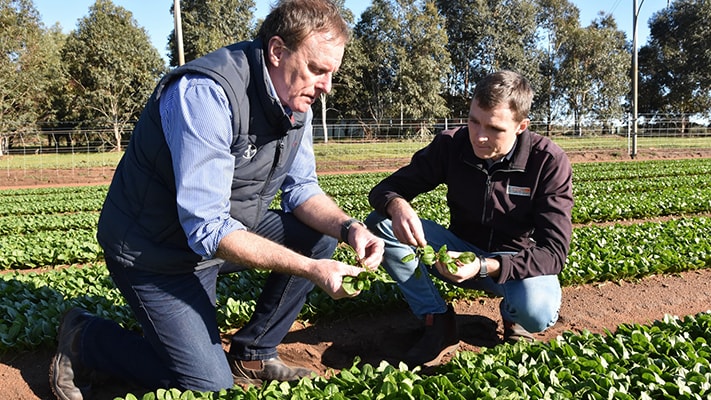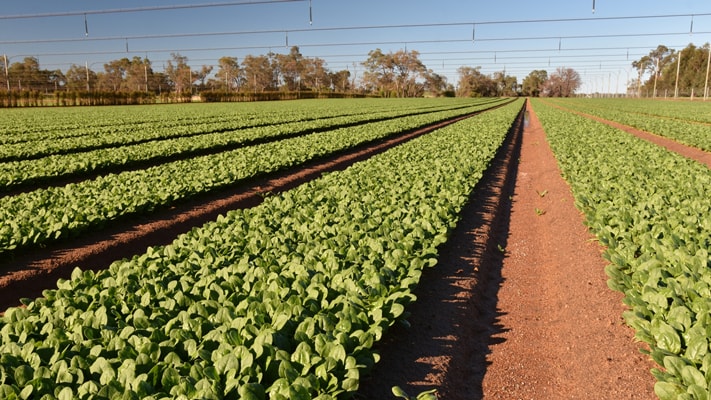Big returns drive biological interest
About
-
Category
- Grower Stories
-
Date
22 September, 2020
-
Location
Western Australia
-

About
Category
- Grower Stories
Date
22 September, 2020
Location
Western Australia
Vegetable grower interest in biological products that improve root development and plant productivity is set to strengthen, especially when they can show a return on investment of $2,600 per hectare.

Image: Ian Cook and Grant Swan examine a baby leaf spinach crop.
That was the outcome from a recent demonstration trial of a novel biological solution in baby leaf spinach near Gingin in Western Australia.
Grant Swan with David Grays Aglink said he had conducted similar trials with other WA growers that also showed strong production benefits.
The Gingin trial investigated the effectiveness of the liquid biological solution, Serenade® Prime from Bayer, applied seven days after the baby leaf spinach emerged.
Serenade Prime contains viable spores of the highly active QST 713 strain of the beneficial bacteria Bacillus amyloliquefaciens. After germination, these beneficial bacteria live on plant root surfaces and in the soil zone around the root system, called the rhizosphere, where they can ameliorate soil nutrients for the plants under suitable conditions.
In annual or perennial crops, pre-emptively colonizing young roots with Serenade Prime allows the opportunity to build the supply of plant-available nutrients ahead of critical periods of nutrient demand.
At Gingin, it was sprayed on to the coarse sand soil at 10 L/ha before irrigation of the baby leaf spinach, which had grown two true leaves.
The replicated treatments comprised 10 metres of the 1.2 m wide rows and were compared alongside the grower’s standard nutrition program.
Measured cuts across the treated and standard nutrition rows revealed an average 5.8% increase in the weight of harvested product where Serenade Prime was applied.
“This is a significant gain with leafy vegetables. You normally harvest around four leaves per plant,’’ Grant said.
“Working on the estimated dollar value per kilogram and extrapolating the cut measurements over a hectare, it equated to a $2,600/ha return.’’

Image: Baby leaf spinach.
He said there also was a two-fold increase in uniformity, which had been observed in other trials as well and was a major crop production benefit.
“It is improving the quality of the leaves.’’
“In a similar trial in the area, where Serenade Prime was applied soon after emergence at 7 L/ha, it showed a 17% yield increase.’’
The baby leaf spinach crops were harvested in the same four-week to 30-day timeframe.
Grant said the improvement in root health was noticeable.
“Using Serenade Prime, growers will see more roots and fine root hairs. It improves the root zone soil and, hence, access to nutrients and allows better water use efficiency.’’
He said grower uptake of the biological solution to ameliorate the soil and in turn help improve root development and general plant health had been encouraging.
“It is being targeted when growers need something to make soil resources more available, which helps to stimulate plant roots.’’
“A lot of crops are also grown on the same rotation, so issues are becoming more prevalent and with limited things working, growers are looking to improve root growth.
“Growers have also been applying it in avocado crops.’’
Grant said Serenade Prime, which was compatible with various other products, could be applied at transplanting, through irrigation systems or by boomspray.
“For direct-seeded crops, growers should wait for crop emergence and the development of plant root systems before applying it. This could be three to seven days after crop emergence.’’
“For longer term crops, growers could go with two applications – at transplanting and then a couple of weeks later.’’
Grant said David Grays Aglink was planning another Serenade Prime trial in watermelons toward the end of this year, incorporating two applications for the 80 to 90-day crop cycle, and with leaf tissue testing carried out to assess plant uptake of nutrients.
In the future, he expected biological products would increasingly be adopted by growers, particularly with supermarkets competing on the basis of chemical-free products and growers looking to avoid using harsh chemicals.



